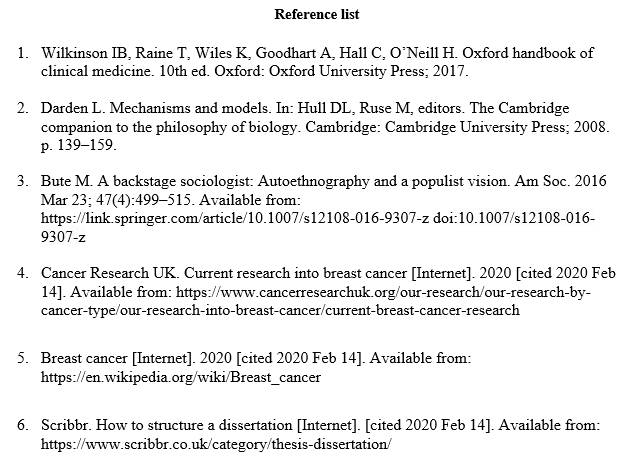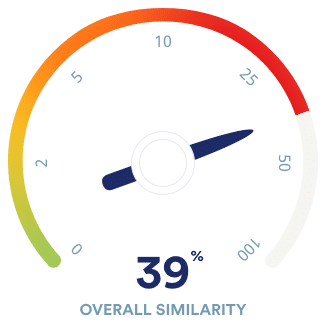Citing Two Cases and Then One of Them Again
Vancouver Referencing | A Quick Guide & Reference Examples
Vancouver is a arrangement of referencing commonly used in biomedicine, amidst other scientific disciplines. In Vancouver manner, y'all place a reference number in the text wherever a source is cited:
Davies et al. state that the data is 'unreliable' (1, p. fifteen).
This number corresponds to an entry in your reference list – a numbered list of all the sources cited in your text, giving complete information on each:
one. Davies B, Jameson P. Advanced economics. Oxford: Oxford University Printing; 2013.
This quick guide presents the most common rules for Vancouver way referencing. Note that some universities and journals take their ain guidelines for the formatting of Vancouver references.
Vancouver in-text citations
In Vancouver mode, citations are marked in your text with numbers. These numbers appear either in parentheses or in superscript – choose one option and stick to it consistently:
| Parentheses numbering | Superscript numbering |
|---|---|
| Levitt (2) argues that … | Levitt2 argues that … |
The numbers usually appear later on the name of the author or after a direct quote. They may also appear at the end of the sentence:
This miracle is increasingly relevant to the discipline (3).
Naming authors
You will ofttimes need to mention the writer when referring to a work or introducing a quote. Only use the author'southward last name in your text. If a source has multiple authors, name only the commencement author followed by 'et al.':
Davies et al. (1) debate that …
Information technology's not always necessary to mention the writer's name in your text – just always include the reference number when you refer to a source:
Some other study (13) explores the concept of …
Numbering references
Sources are numbered based on the order in which they are cited in the text: the beginning source you cite is 1, the second ii, so on.
If the aforementioned source is cited again, use the same number to refer to it throughout your paper. This means that the numbers might not appear in consecutive order in your text:
Collins et al. (1) argue that this technique is highly constructive. However, another written report (2) conducted into the technique has raised doubts about the replicability of these results. Collins et al.'s conclusion that the technique is gear up for 'big-scale application' (ane, p. 15) in medical practice should therefore not be accepted without farther investigation.
Citing multiple sources
Y'all can also cite multiple sources in the same place:
Several studies (8, 12) indicate a similar effect.
To cite several sources that announced consecutively in your numbered list, you can utilise an en nuance to marking the range.
At that place is a large body of enquiry (1, iv–7) exploring this phenomenon.
In this case, the citation refers the reader to sources i, four, five, 6, and 7.
Citing page numbers
You must specify a folio number or range when you directly quote a text, and it can exist helpful to practice and then when you are paraphrasing a particular passage.
Place the page number after the reference number within the same parentheses, preceded by 'p.':
Bute refers to his project as 'a madcap journey through America'south disciplinary institutions' (4, p. 499).
If you're using superscript numbers, the folio number also appears in superscript, in parentheses after the reference number:
… 'a madcap journey through America's disciplinary institutions'.iv (p. 499)
Creating a Vancouver reference list
Your reference list is where you provide the data your readers will demand in society to look up the sources cited in your text. It consists of a numbered list of all your sources, providing key information including the author, title and publication appointment of each source.
The list appears in numerical gild at the end of your paper. Each entry ends with a full stop, unless the last element is a DOI or URL.
Vancouver reference list example

Author names
Each entry starts with the author's final proper name and initials.
When a source has more than one author, their names are separated past commas. If a source has more six authors, list the first vi followed by 'et al.'
| 1 writer | Shields G. |
|---|---|
| 2–6 authors | Johnson FH, Singh J. |
| 7+ authors | James F, Pieters J, Deptford Thousand, Harrison R, Bregman E, Empson A, et al. |
Source titles
Only the beginning word of the championship and subtitle, along with any proper nouns, are capitalised:
The Cambridge companion to the philosophy of biological science.
Titles in Vancouver referencing are consistently written in plain text. Do not employ italics or quotation marks.
What is your plagiarism score?
Compare your newspaper with over 60 billion web pages and 30 million publications.
- Best plagiarism checker of 2020
- Plagiarism report & percentage
- Largest plagiarism database
Scribbr Plagiarism Checker

Vancouver reference examples
The information you provide differs co-ordinate to the type of source you're citing, since unlike details are relevant in different cases. Formats and examples for the most usually cited source types are given below.
| Format | 10. Author(south). Title. Edition. Identify of publication: Publisher; Yr. |
| Case | 1. Wilkinson IB, Raine T, Wiles M, Goodhart A, Hall C, O'Neill H. Oxford handbook of clinical medicine. 10th ed. Oxford: Oxford University Press; 2017. |
| Notes |
|
| Format | x. Writer(s). Championship of affiliate. In: Editor(s), editors. Title of book. Identify of publication: Publisher; Twelvemonth. Page range. |
| Example | two. Darden L. Mechanisms and models. In: Hull DL, Ruse Thou, editors. The Cambridge companion to the philosophy of biological science. Cambridge: Cambridge University Press; 2008. p. 139–159. |
| Notes |
|
| Format | x. Author(s). Article championship. Journal Name (abbreviated). Year Month Day; Volume(Issue):page range. Bachelor from: URL DOI |
| Case | 3. Bute M. A backstage sociologist: Autoethnography and a populist vision. Am Soc. 2016 Mar 23; 47(4):499–515. Available from: https://link.springer.com/article/x.1007/s12108-016-9307-z doi:x.1007/s12108-016-9307-z |
| Notes |
|
| Format | x. Author(south). Championship [Net]. Year [cited Date]. Available from: URL |
| Example | iv. Cancer Research UK. Current research into breast cancer [Cyberspace]. 2020 [cited 2020 Feb 14]. Available from: https://www.cancerresearchuk.org/our-inquiry/our-inquiry-by-cancer-type/our-enquiry-into-breast-cancer/electric current-breast-cancer-research |
| Notes |
|
Missing information in Vancouver references
Some sources will be missing some of the information needed for a complete reference. See below for how to handle missing elements.
No author
Every bit shown in the website example above, when no private author is named, you can usually proper name the organisation that produced the source every bit the author.
If there is no clear corporate author – for example, a wiki that is created and updated collaboratively by users – you can begin your reference with the title instead:
five. Breast cancer [Internet]. 2020 [cited 2020 Feb fourteen]. Bachelor from: https://en.wikipedia.org/wiki/Breast_cancer
No appointment
Sources such as websites may lack a clear publication date. In these cases you can omit the year in your reference and just include the date of your commendation:
6. Scribbr. How to structure a dissertation [Internet]. [cited 2020 Feb 14]. Bachelor from: https://www.scribbr.co.britain/category/thesis-dissertation/
No page numbers
You may want to testify the location of a direct quote from a source without page numbers, such as a website. When the source is brusk, you can ofttimes just omit this, but where you experience it's necessary you tin apply an alternating locator like a heading or paragraph number:
NASA calls the telescope 'the about meaning advance in astronomy since Galileo's telescope' (5, para. 5).
Frequently asked questions almost Vancouver referencing
- What'south the difference between Harvard and Vancouver referencing styles?
-
Harvard referencing uses an writer–date system. Sources are cited by the author's last proper name and the publication year in brackets. Each Harvard in-text citation corresponds to an entry in the alphabetised reference list at the terminate of the paper.
Vancouver referencing uses a numerical system. Sources are cited by a number in parentheses or superscript. Each number corresponds to a full reference at the cease of the newspaper.
Harvard style Vancouver manner In-text citation Each referencing style has different rules (Pears and Shields, 2019). Each referencing style has different rules (1). Reference list Pears, R. and Shields, Chiliad. (2019). Cite them correct: The essential referencing guide. 11th edn. London: MacMillan. i. Pears R, Shields G. Cite them right: The essential referencing guide. 11th ed. London: MacMillan; 2019. - When should I utilise an in-text commendation in Vancouver mode?
-
A citation should appear wherever yous use data or ideas from a source, whether by quoting or paraphrasing its content.
In Vancouver fashion, you have some flexibility about where the citation number appears in the sentence – usually directly later on mentioning the author'south proper name is best, simply simply placing it at the end of the sentence is an acceptable alternative, every bit long equally it's clear what information technology relates to.
Is this article helpful?
You lot have already voted. Thanks :-) Your vote is saved :-) Processing your vote...
Source: https://www.scribbr.co.uk/referencing/vancouver-style/
0 Response to "Citing Two Cases and Then One of Them Again"
Postar um comentário